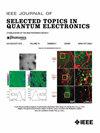A Formal Scheme of Fault Injection on Coherent Integrated Photonic Neural Networks
IF 4.3
2区 工程技术
Q1 ENGINEERING, ELECTRICAL & ELECTRONIC
IEEE Journal of Selected Topics in Quantum Electronics
Pub Date : 2024-11-07
DOI:10.1109/JSTQE.2024.3493857
引用次数: 0
Abstract
Based on Mach-Zehnder interferometers (MZIs) coherent integrated photonic neural networks (PNNs) may provide a promising solution for the realization of deep learning with low power consumption, low latency, and ultra-high speed. Adversarial attacks have been widely confirmed to be a serious threat to deep learning. This has led to a large amount of studies in this direction of the electronic domain, including input attacks and inject faults for weights. In this paper, focusing on the phases in the linear operation unit of PNNs, a phase gradient attack (PGA) scheme based on the phase gradient sorting of the MZI-arrays and injecting disturbances along the gradient direction is proposed for the first time. The simulation results indicate that even with weak-intensity PGA, it is almost impossible for PNNs to perform the classification inference. Furthermore, taking into account the effects of fabrication-process variations (FPV) and thermal crosstalk in MZI-arrays that lead to tuning phase deviation in practical application, we systematically analyzed the validity of proposed scheme on the PNNs with phase uncertainties. Specifically, we tested the impact of injecting faults by compressing the number of attacked phase angles to 3, 5, and 7, respectively. The experiment results show that injection attack based using PGA on PNNs trained with Gaussian datasets would reduce classification accuracy to 27.97%, 15.47%, and 8.91% for corresponding cases.相干集成光子神经网络的正式故障注入方案
基于马赫-泽恩德干涉仪(MZIs)的相干集成光子神经网络(PNNs)为实现低功耗、低延迟和超高速的深度学习提供了一种前景广阔的解决方案。逆向攻击已被广泛证实是对深度学习的严重威胁。因此,电子领域在这一方向开展了大量研究,包括输入攻击和权重注入故障。本文针对 PNN 线性运算单元中的相位,首次提出了一种基于 MZI 阵列相位梯度排序并沿梯度方向注入干扰的相位梯度攻击(PGA)方案。仿真结果表明,即使使用弱强度的 PGA,PNN 也几乎无法进行分类推理。此外,考虑到 MZI 阵列中的制造工艺变化 (FPV) 和热串扰会导致实际应用中的调谐相位偏差,我们系统分析了所提方案对具有相位不确定性的 PNN 的有效性。具体而言,我们测试了注入故障的影响,将攻击相位角的数量分别压缩为 3、5 和 7。实验结果表明,在使用高斯数据集训练的 PNN 上使用基于 PGA 的注入攻击会将相应情况下的分类准确率降低到 27.97%、15.47% 和 8.91%。
本文章由计算机程序翻译,如有差异,请以英文原文为准。
求助全文
约1分钟内获得全文
求助全文
来源期刊

IEEE Journal of Selected Topics in Quantum Electronics
工程技术-工程:电子与电气
CiteScore
10.60
自引率
2.00%
发文量
212
审稿时长
3 months
期刊介绍:
Papers published in the IEEE Journal of Selected Topics in Quantum Electronics fall within the broad field of science and technology of quantum electronics of a device, subsystem, or system-oriented nature. Each issue is devoted to a specific topic within this broad spectrum. Announcements of the topical areas planned for future issues, along with deadlines for receipt of manuscripts, are published in this Journal and in the IEEE Journal of Quantum Electronics. Generally, the scope of manuscripts appropriate to this Journal is the same as that for the IEEE Journal of Quantum Electronics. Manuscripts are published that report original theoretical and/or experimental research results that advance the scientific and technological base of quantum electronics devices, systems, or applications. The Journal is dedicated toward publishing research results that advance the state of the art or add to the understanding of the generation, amplification, modulation, detection, waveguiding, or propagation characteristics of coherent electromagnetic radiation having sub-millimeter and shorter wavelengths. In order to be suitable for publication in this Journal, the content of manuscripts concerned with subject-related research must have a potential impact on advancing the technological base of quantum electronic devices, systems, and/or applications. Potential authors of subject-related research have the responsibility of pointing out this potential impact. System-oriented manuscripts must be concerned with systems that perform a function previously unavailable or that outperform previously established systems that did not use quantum electronic components or concepts. Tutorial and review papers are by invitation only.
 求助内容:
求助内容: 应助结果提醒方式:
应助结果提醒方式:


